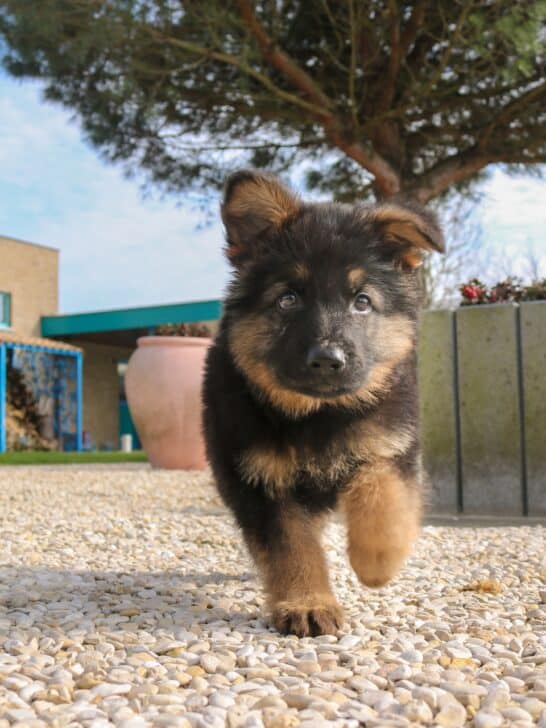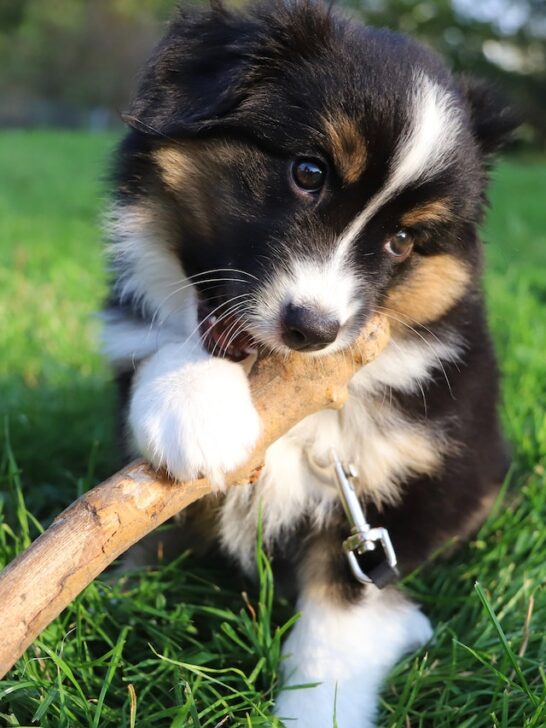Can a German Shepherd Beat a Wolf? How To Keep Your Dog Safe
German Shepherds are well known for their guarding abilities, due to their incredible strength and voracious protective instinct. However, they’re also lovable companions, and many of them are used to a pampered life. Wolves, on the other hand, remain wild.
A German Shepherd could not beat a wolf in a fight. Wolves are incredible predators, and the domesticated dog is no match. If a wolf were to attack the German Shepherd, the dog would likely end up badly injured, if not killed.
In this article we explain why German Shepherds, powerful as they may be, can’t beat a wolf. As well as tips on how to keep you, and your dog safe, we discuss the unique characteristics that make a wolf so dangerous.
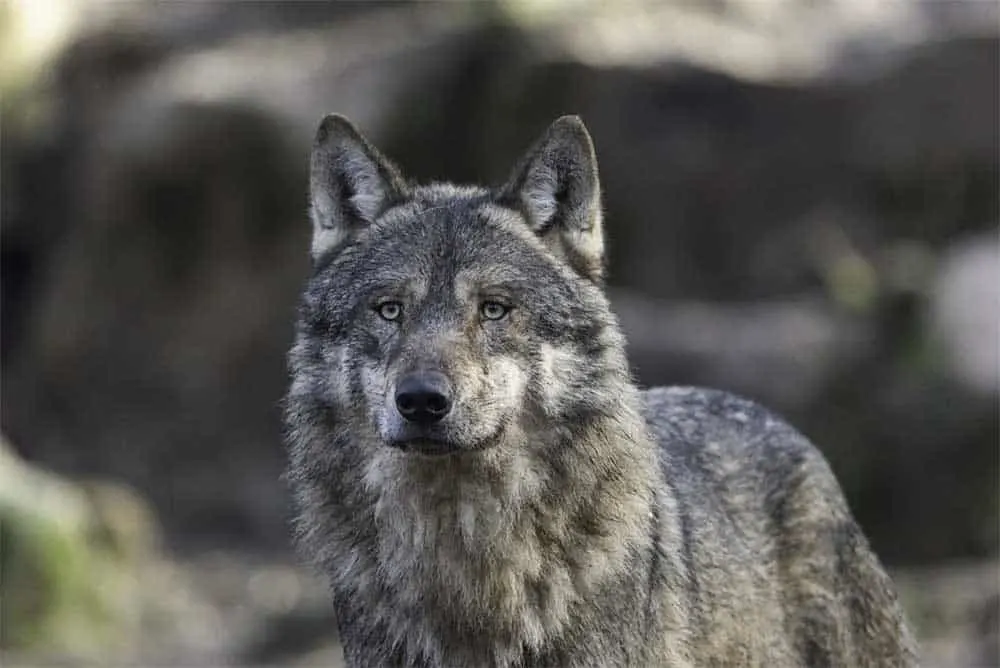
The History of Wolves and Dogs
With some dogs, it’s incredibly easy to see the wolf ancestry. Other breeds, you’d hardly imagine there’s any wolf at all. German Shepherds fall onto the wolf end of the spectrum, with their sharp eyes, long muzzles, and upright ears.
While dogs were originally bred from domesticated wolves, enough history has passed for them to be a distinctly different species. And this stands for temperament, as well as appearance. Wolves remain wild animals, and are considerably dangerous.
Nowadays, dogs are primarily seen as companions. However, there are still many working dogs. If you’ve ever seen a German Shepherd working as a police dog, or watching over livestock, it isn’t difficult to see they retain close ties to their wolf ancestors. But could a German Shepherd ever take down a wolf?
Can a German Shepherd Beat a Wolf?
A German Shepherd cannot beat a wolf. A wolf is the stronger animal, and has numerous advantages.
For a start, there’s quite a size difference. Although German Shepherds are large dogs, they’re nowhere near the size of wolves. The average fully grown male German Shepherd is 60 – 65 cm, and 48 – 88 pounds. A wolf, on the other hand, is 80-85 cm tall, and can weigh between 66 and 176 pounds.
German Shepherds have been domesticated, and any good owner will have trained and socialized their dog from a young age.
While some German Shepherds have experience in hunting, they’re mostly pets. Even working German Shepherds are unlikely to need to hunt for their food. Conversely, wolves will be hunting from a young age. It’s how they keep themselves fed. Although German Shepherds have a voracious prey drive, it isn’t as necessary or as well-honed as that of a wolf.
Bite Strength
German Shepherds have a powerful bite, and one you certainly wouldn’t want to be on the wrong end of. At 238 pounds per square inch (PSI), that’s almost twice that of a human. German Shepherds have one of the most powerful bites of any dog, although a few outrank it. The American Bulldog, Leonberger, English Mastiff, and Kangal are just some breeds with an even stronger jaw.
The German Shepherd bite is impressive, but the wolf far outranks it. A normal wolf bite is 400 PSI. However, when provoked, the wolf can have a bite of up to 1200 PSI. Undoubtedly, if a wolf were to attack a German Shepherd, it would use every bit of power it could.
The bite of a German Shepherd could hurt a wolf, but it would need to get in quite a few bites before any real damage is done. A wolf only needs to exert some pressure from its powerful jaws to cause serious injury to a German Shepherd.
Speed
Both the German Shepherd and the wolf are quick animals, but neither of them are really known for their speed. Wolves prefer to stalk their prey, before using a short burst of speed. At full power, a wolf can reach a speed of around 36-38 mph.
German Shepherds are a little slower, reaching a top speed of 30 mph. This actually makes them some of the fastest dogs around, but still not enough to outrun a wolf. The wolf is also ruthlessly persistent, and can track its prey for hours at a steady speed.
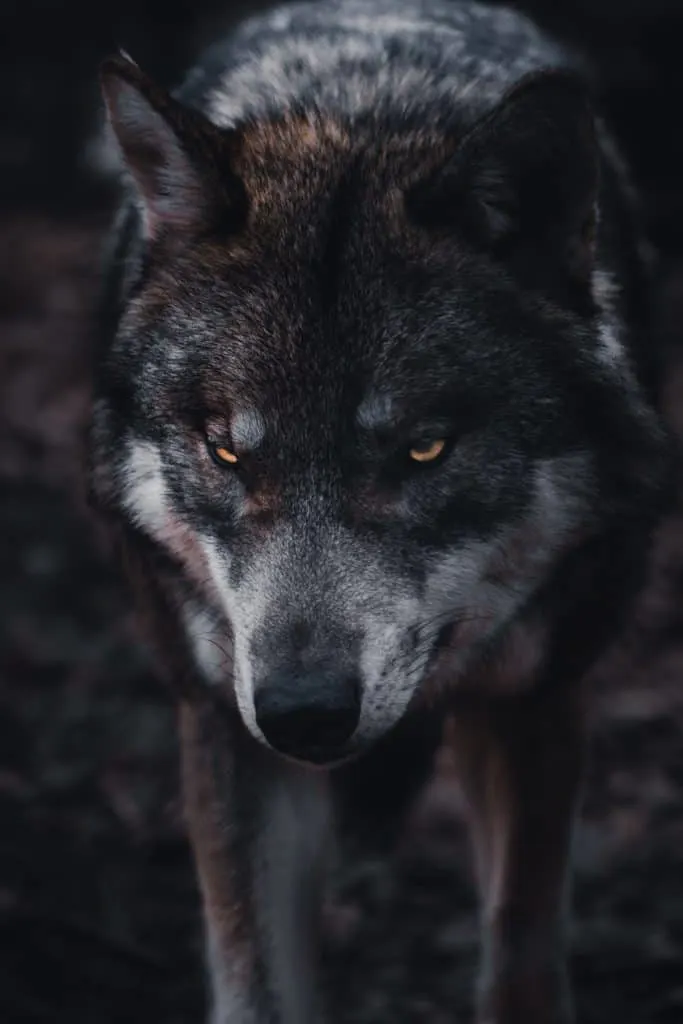
The Pack
It’s unlikely for a wolf to attack a dog unprovoked. However, a wolf may feel provoked because a dog encroached on its territory accidentally. The wolf takes this as a threat, and is compelled to attack.
This leads us to one of the major dangers of wolf attacks: the pack. While the image of the lone wolf is widespread, the reality is that most wolves travel in packs. That pack will work together if they think there’s a threat. If a German Shepherd has only the tiniest chance of beating a single wolf, they have almost no chance of beating a pack.
The pack also explains the powerful motivation behind a potential attack on a German Shepherd. A wolf is unlikely to attack the dog as a food source. Instead, they’ll be motivated by the instinctive determination to protect the pack.
The German Shepherd does have a similar loyalty, which is why they’re often chosen for guard dogs. If a wolf attacked a German Shepherd, the dog would do what it can to protect its own perceived pack. However, up against the power and force of a wolf, they stand little chance.
When to be on guard for a wolf attacking a German Shepherd
For many of us, wolves present little threat in our daily lives. North America only has 18,000 wolves left in the wild, and most of them live in Alaska. However, it doesn’t take a great deal of wolves to cause a significant amount of damage. If there are wolves in your area, it’s important to be aware of the threat they pose.
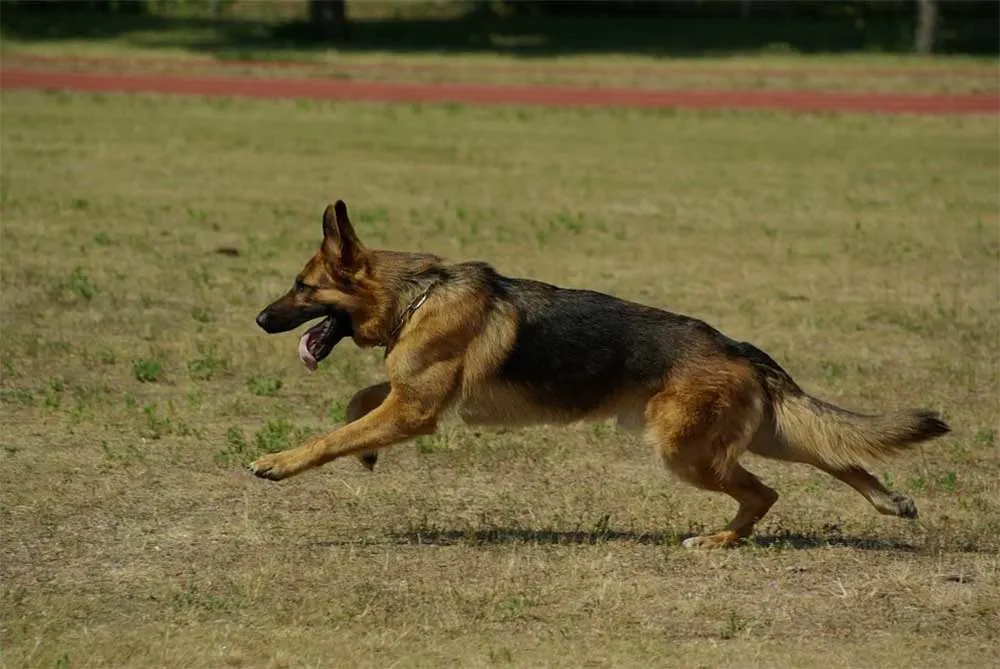
Herding Livestock
German Shepherds are common working dogs, and one job they’re often used for is herding livestock (the clue is in the name). A well-trained German Shepherd will move the livestock, and act as a simple look-out.
In this position, a German Shepherd does play a role as a guard dog. However, they wouldn’t be expected to attack the wolf. Instead, the presence of the dog simply indicates that any attacks won’t go unchallenged. Wolves prefer prey that’s easier to pick off. Having spotted a large dog watching over the animals, the wolf should look elsewhere for its dinner.
This can account for why it’s rare for a wolf to attack a shepherding dog, but attacks on livestock still occur. Wolves will stay aware of when a prey animal is left on its own, possibly as it grazes on open pastures.
However, wolves do still present a risk to a herding German Shepherd, and attacks do happen.
Living in the Backcountry
Wolves tend to live in sparsely populated areas, so they don’t have a great deal of contact with humans. But there are areas where wolves and humans live close by. If there is a particularly low food source, a wolf may come quite close to occupied homes. This risk is significantly greater for those living in the backcountry.
If you’re living or staying in a property that borders woodland, then your German Shepherd may be at risk of wolves. Particularly if you’re using it as a guard dog.
It’s also important to be aware of the risks if you’re hiking or camping in the backcountry. If you’re accompanied by a German Shepherd, you might imagine they provide all the protection you need. While a German Shepherd may deter some attacks, if you encroach on wolf territory, the threatened wolf is dangerous.
If you’re camping or hiking, take care to avoid areas with a wolf population. Stay alert for wolf tracks, or droppings.
Be careful not to leave out any food, whether in your backyard or when camping. This can attract wolves to your home.

How to keep your German Shepherd (and yourself) safe from wolves
German Shepherds are no longer considered a good choice for guarding livestock. They have a high prey drive, which means they need a significant level of training. They’re also vulnerable to attack, despite their initial appearance. No dogs should be left to guard livestock in areas with wolves.
If you’re heading to the backcountry, and you want to take your German Shepherd, there are a few precautions to take.
The main priority is to research where you go. Even if you want to get as far from the beaten track as possible, you need to know you’re heading somewhere safe. Wolf territories must be treated with respect. We don’t want wolves walking through our homes, so we should research to avoid walking through theirs.
When you’re out and about, learn to recognize your own dog’s tracks. Wolf tracks are generally bigger, and tend to stay in a straight line.
Don’t leave your German Shepherd unattended, especially overnight. If you’re camping in the backcountry, don’t leave your dogs outside alone.
Lock away and secure any food, and feed your dog inside if you can.
How to act if you encounter a wolf
The first thing you need to do if you encounter a wolf is stay calm. Not only do you need to keep yourself rational, you need to be sure your dog remains calm as well. Don’t start running. Wolves can accelerate to speeds upwards of 30 mph, and don’t tire easily.
- Stand tall, and try to make yourself look larger.
- Bring your dog to heel, and keep them close.
- Slowly back away from the wolf, maintaining eye contact.
- Don’t turn your back.
- If the wolf doesn’t retreat, or is starting to act aggressively, yell and throw things. This is done to deter the wolf from attacking. Keep backing away slowly.
Never approach a wolf, and never offer them food. Wolves should not be habituated. If you encounter a wild wolf, always leave it alone.
Should your dog attack the wolf, you must not get involved. Use bear spray to try and separate them, and remain physically distant.
It goes without saying that the best protection against a wolf is to avoid an encounter with a wolf. Before travelling, be sure to check whether there are any wolves in the area, stay alert, and avoid doing anything that may attract them.
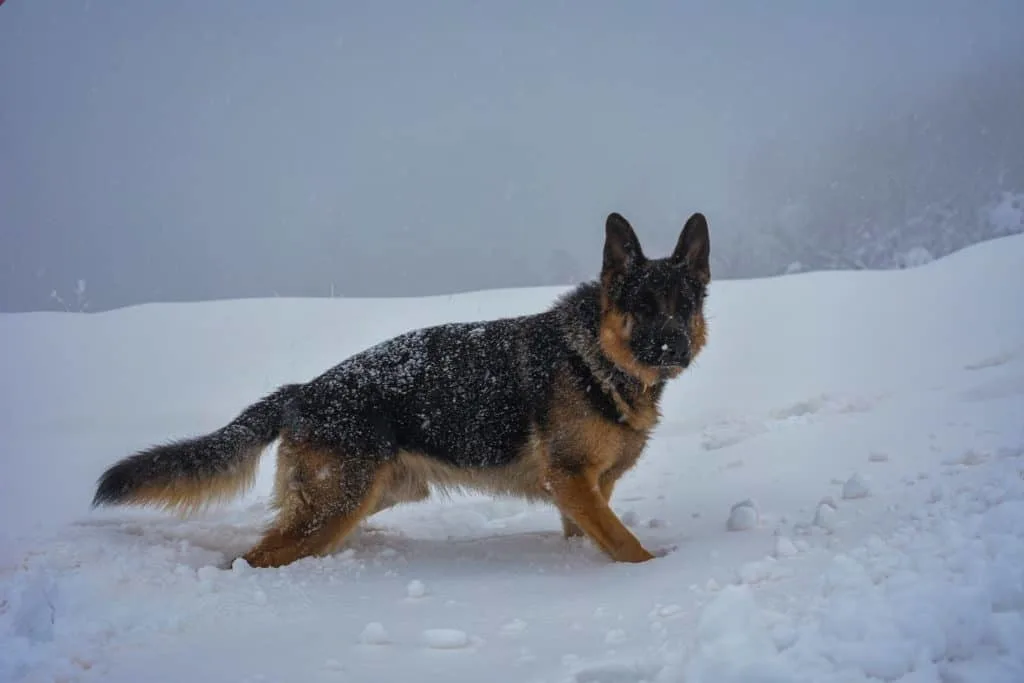
Are there any dogs that can beat a wolf?
The wolf’s impressive bite PSI is strong, but it isn’t unmatched. There are a few dogs that could potentially beat a single wolf. These dogs combine an incredible bite with a large size, thick coat, and ferocious protective instinct.
The Kangal is the breed most likely to stand a chance against a wolf. Kangals have a bite force of 743 PSI, a large and heavy frame, and great intelligence. A Kangal can be 86 cm tall, with a weight of 132 lb. Their massive size is enough to deter most attacks.
Bred in Turkey for the specific purpose of guarding livestock against wolves and bears, these incredible dogs stand the best chances of winning a fight with a wolf.
Final Thoughts
German Shepherds are fantastic guard dogs, thanks to their power and loyalty. However, they stand almost no chance against a wolf. Wolves have a stronger jaw, a better bite, and a greater hunting instinct.
To keep your German Shepherd safe, the best thing to do is research to avoid any encounters with a wolf. If you do come across one, stay calm and keep your dogs close.
























